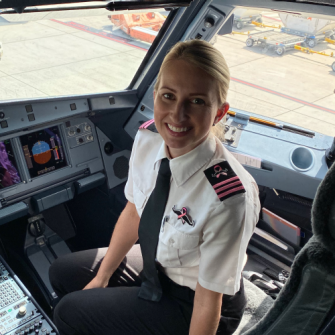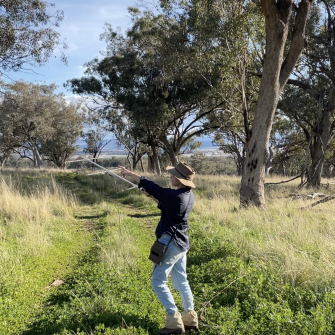Master of Aviation Management
- Commencing Terms
- Term 1, 2 & 3
- Duration
- 2 Year(s)
- Delivery Mode
- Online
- Campus
-
Kensington
- Codes
- Program code 8741
- CRICOS code N/A
-
2026 Indicative first year full fee
- $37,500*
-
2026 Indicative full fee to complete degree
- $77,000*
-
2026 Indicative first year full fee
- $47,500*
-
2026 Indicative full fee to complete degree
- $99,500*
Application closures for 2026
Undergraduate programs for 2026 intakes are closed for New Overseas Student Commencement (NOSC) applications. Applications for postgraduate programs remain open. Find out if this closure applies to you.
- Overview
- Entry requirements
- What will I study?
- Future careers
- How to apply
- Fees & Scholarships
Overview
Ready to lead in the aviation industry? If you're a seasoned professional with a university degree, this master’s program is your runway to top roles in aviation.
Connect with a wide range of leading aviation industry professionals, enhance your understanding of key aviation issues and accelerate your career growth. In this flexible, online program, you’ll gain essential knowledge in science, engineering, interpersonal relations and the environment. To grow your specialised skill set, you’ll also explore law and regulations, safety and security, airline and airport management, technical operations and aviation economics.
You can complete the Master of Aviation Management in 2 years or less with full-time study. Upon graduation, you’ll be ready to take on roles in various sectors of the aviation and transport industry, including airlines, airports and government agencies.
Key features
Career opportunities
Take advantage of the growing demand for aviation professionals and launch your career in aviation management or enhance your current role with industry knowledge. We welcome students from non-aviation backgrounds, such as law or finance, who want to enter the industry or work with aviation organisations. Personnel with technical skills, such as engineers and pilots, can enhance their knowledge of management and commercial issues. If you have a business background, this degree will help you understand airline strategy and technical issues, which impact aviation operations.
Flexible, online learning
Make your studies work for you. Customise your courses and study load to suit your schedule, with full-time and part-time options available. This program is delivered via distance using the university’s eLearning system. Each course has its own facilitator who will lead discussion groups and activities, and advise students on coursework and assignments.
Research project
At UNSW, a global top 20 university (QS World University Rankings, 2025), you'll bring together everything you’ve learned in a final research project, demonstrating your initiative and ability to apply your knowledge to solve problems in the aviation industry.
Why study at UNSW?
Join a global top 20 university
UNSW is the highest-ranked global university with a stand-alone aviation school that offers aviation degrees, operates flight training under its own Air Operator’s Certificate and undertakes research. As a global top 20 university (QS World University Rankings, 2024–2026), the School of Aviation has been at the forefront of the industry for over 25 years, offering opportunities, mentorships and extensive industry partnerships and connections.
Learn from expert educators
Our industry facilitators bring a wealth of aviation experience, while our academic staff regularly engage with regulatory authorities, industry bodies and research collaborators. Our courses are written by experts with substantial industry experience, like Trevor Jones, Head of Security at Qantas, Greg Hay, General Manager Operations at Sydney Airport and Kevin McMurtrie, Senior Flying Oerpations Inspector at CASA.
Industry-relevant knowledge and experience
This postgraduate program was designed alongside industry experts and the Australian aviation industry to prepare graduates for future leadership positions in the aviation sector. You’ll learn critical thinking and decision-making skills in topics including airline marketing, aviation safety and security and flight operations and have the chance to gain first-hand work experience through industry-based scholarships and internships on offer.
Want to see more from UNSW Science?
Entry requirements
For entry into this program, you must have a three-year undergraduate bachelor’s degree. There are four different entry groups – the group you belong to will depend on the discipline of your undergraduate degree and years of industry experience (if applicable). If you have more than half a year of relevant professional experience you may be eligible for advanced standing into the program which will shorten the duration of your studies.
Entry group one
This group may be eligible for 48 units of credit of advanced standing. This group includes any of the following:
- Bachelor of Aviation (Honours) with no industry experience
- Bachelor of Aviation with minimum two years' industry experience
- bachelor’s degree in cognate area with minimum two years' industry experience
- bachelor’s degree in non-cognate area with minimum five years' industry experience
Entry group two
This group may be eligible for 36 units of credit of advanced standing. This group includes any of the following:
- Bachelor of Aviation with minimum 0.5 years industry experience
- bachelor’s degree in cognate area with minimum 0.5 years industry experience
- bachelor’s degree in non-cognate area with minimum two years' industry experience
Entry group three
This group may be eligible for 24 units of credit of advanced standing. This group includes any of the following:
- bachelor’s degree in non-cognate area with minimum 0.5 years industry experience
Entry group four
This group is not eligible for any advanced standing. This group includes:
- bachelor’s degree in non-cognate area with no industry experience
| Group | Degree | Industry Experience | Standing (UOC) | Required to complete at UNSW | Required to graduate MAvMgmt |
| 1 | Bachelor of Aviation (Honours) | N/A | 48 | 48 | 96 |
| Bachelor of Aviation | Minimum 2 years | ||||
| Bachelor's degree in cognate area | Minimum 2 years | ||||
| Bachelor's degree in non-cognate area | Minimum 5 years | ||||
| 2 | Bachelor of Aviation | Minimum 0.5 years | 36 | 60 | 96 |
| Bachelor's degree in cognate area | Minimum 0.5 years | ||||
| Bachelor's degree in non-cognate area | Minimum 2 years | ||||
| 3 | Bachelor's degree in non-cognate area | Minimum 0.5 years | 24 | 72 | 96 |
| Bachelor of Aviation | 0 | ||||
| Bachelor's degree in cognate area | 0 | ||||
| 4 | Bachelor's degree in non-cognate area | 0 | 0 | 96 | 96 |
Cognate degrees
Any degrees from any of the following disciplines:
- aviation
- science
- engineering
- psychology
- management
- economics
- commerce
Examples of industry experience
Your industry experience could be (but not limited to) any of the following:
- advanced flying training (e.g. any holder of command instrument rating, commercial pilot licence or air transport pilot licence)
- air traffic controller
- airport operations specialist
- airport compliance personnel
- airport/aviation consultant
- aviation legal practitioner
- airline captain, first officer, second officer or line pilot
- business strategy analyst
- defence force personnel
- flying instructor
- flight attendant
- flight scheduler
- human factors analyst
- licensed aircraft maintenance engineer
- aircraft technician
- managerial role
- marketing and sales personnel
- network planner
- police and fire fighters
- research analyst
- revenue analyst
- flight dispatcher and load controller
- flight safety operations
- risk management personnel.
English language requirements
You may be asked to provide evidence of your English proficiency to study at UNSW depending on your educational background and citizenship. English language skills are vitally important for coping with lectures, tutorials, assignments and examinations - this is why UNSW requires a minimum English language competency for enrolment.
If you’re completing an Australian Year 12 qualification (e.g. NSW HSC or equivalent), you do not need to provide anything extra to prove your proficiency. Your qualification will be used as evidence of your English proficiency.
If you do need to provide evidence of your English proficiency, this will be indicated in your application. You can prove this by providing evidence that you meet one or more of the following criteria:
- English language tests and university English courses
- Prior study in the medium of English
- Other qualifications
If you need to improve your English skills before you start your degree, UNSW College’s Academic English Programs are for you. The programs are suitable for various English levels and help you prepare for university studies and life in Australia.
For more details, visit the English Language Requirements page.
For entry into this program, you must have a three-year undergraduate bachelor’s degree. There are four different entry groups – the group you belong to will depend on the discipline of your undergraduate degree and years of industry experience (if applicable). If you have more than half a year of relevant professional experience you may be eligible for advanced standing into the program which will shorten the duration of your studies
Entry group one
This group may be eligible for 48 units of credit of advanced standing. This group includes any of the following:
- Bachelor of Aviation (Honours) with no industry experience
- Bachelor of Aviation with minimum two years' industry experience
- bachelor’s degree in cognate area with minimum two years' industry experience
- bachelor’s degree in non-cognate area with minimum five years' industry experience
Entry group two
This group may be eligible for 36 units of credit of advanced standing. This group includes any of the following:
- Bachelor of Aviation with minimum 0.5 years industry experience
- bachelor’s degree in cognate area with minimum 0.5 years industry experience
- bachelor’s degree in non-cognate area with minimum two years' industry experience
Entry group three
This group may be eligible for 24 units of credit of advanced standing. This group includes any of the following:
- bachelor’s degree in non-cognate area with minimum 0.5 years industry experience
Entry group four
This group is not eligible for any advanced standing. This group includes:
- bachelor’s degree in non-cognate area with no industry experience
| Group | Degree | Industry experience | Standing (UOC) | Required to complete at UNSW | Required to graduate MAvMgmt |
| 1 | Bachelor of Aviation (Honours) | N/A | 48 | 48 | 96 |
| Bachelor of Aviation | Minimum 2 years | ||||
| Bachelor's degree in cognate area | Minimum 2 years | ||||
| Bachelor's degree in non-cognate area | Minimum 5 years | ||||
| 2 | Bachelor of Aviation | Minimum 0.5 years | 36 | 60 | 96 |
| Bachelor's degree in cognate area | Minimum 0.5 years | ||||
| Bachelor's degree in non-cognate area | Minimum 2 years | ||||
| 3 | Bachelor's degree in non-cognate area | Minimum 0.5 years | |||
| Bachelor of Aviation | 0 | ||||
| Bachelor's degree in cognate area | 0 | 24 | 72 | 96 | |
| 4 | Bachelor's degree in non-cognate area | 0 | 0 | 96 | 96 |
Cognate degrees
Any degrees from any of the following disciplines:
- aviation
- science
- engineering
- psychology
- management
- economics
- commerce
Examples of industry experience
Your industry experience could be (but not limited to) any of the following:
- advanced flying training (e.g. any holder of command instrument rating, commercial pilot licence or air transport pilot licence)
- air traffic controller
- airport operations specialist
- airport compliance personnel
- airport/aviation consultant
- aviation legal practitioner
- airline captain, first officer, second officer or line pilot
- business strategy analyst
- defence force personnel
- flying instructor
- flight attendant
- flight scheduler
- human factors analyst
- licensed aircraft maintenance engineer
- aircraft technician
- managerial role
- marketing and sales personnel
- network planner
- police and fire fighters
- research analyst
- revenue analyst
- flight dispatcher and load controller
- flight safety operations
- risk management personnel.
English language requirements
You may be asked to provide evidence of your English proficiency to study at UNSW depending on whether you are from an English-speaking background or non-English speaking background. English language skills are vitally important for coping with lectures, tutorials, assignments and examinations - this is why UNSW requires a minimum English language competency for enrolment.
If English is not your first language, you’ll need to provide proof of your English proficiency before you can be given an offer to study at UNSW. You can do this by providing evidence that you meet one or more of the following criteria:
- English language tests and university English courses
- Prior study in the medium of English
- Other qualifications
If you need to improve your English skills before you start your degree, UNSW College’s Academic English Programs are for you. The programs are suitable for various English levels and help you prepare for university studies and life in Australia.
For more details, visit the English Language Requirements page.
Check the specific English language requirements for this program
What will I study?
UNSW is introducing a new academic calendar from 2028.
We are moving to a new flex-semester calendar. What does this mean for your studies?
Program structure
The Master of Aviation Management is designed to equip professionals with the essential skills and knowledge to thrive in the aviation management space.
Students have the options to choose up 2 of new optional specialisations below:
- Human Factors and Safety
- Airport Operations Management
- Airline Operations
Core (compulsory) courses - 24 UOC
- Aviation Operations Management
- Airline Corporate Management
- Aviation Human Factors
- Aviation Research Project
Tailor your learning journey to fit your goals, interests and lifestyle. The Master of Aviation Management offers up to 96 units of credit (UOC) from elective courses, in addition to the core (compulsory) 24 UOC. Designed and delivered by aviation experts, the program prepares you for success in today's aviation environment and can be completed part-time or full-time.
Full program structure
This program contains a total of 96 units of credit (UOC) and can be completed in 2 years with full-time study or 4 years with part-time study.
Core (compulsory) courses - 24 UOC
- Aviation Operations Management (6 UOC)
- Airline Corporate Management (6 UOC)
- Aviation Human Factors (6 UOC): Students who completed AVIA5017 are excluded from undertaking AVIA5018 and vice versa.
- Aviation Research Project (6 UOC): Students are encouraged to take this course within the first two terms of commencing their program, to enhance the foundations that underpin all courses within their Program and set them up for success.
-
- Law and Regulations in Aviation (6 UOC)
- Aviation and Security (6 UOC)
- Airline Resource Management (6 UOC)
- Airport Planning (6 UOC)
- Air Traffic Management (6 UOC)
- Safety Management Systems (6 UOC)
- Flight Data Analytics (6 UOC)
- Aircraft Accident Investigation Techniques (6 UOC)^
- Aviation Research Project (Extension) (6 UOC)
- Aviation, Tourism and Sustainable Development (6 UOC)
- Sustainable and Advanced Aviation (6 UOC)
- Practical Data Analytics for Aviation Managers (6 UOC)
- Aviation Policy (6 UOC)
- Airline Operations and Delay Management (6 UOC)
- Airworthiness for Transport Category Aircraft (6 UOC)
- Safety Risk Management (6 UOC)#
^Students are recommended to complete AVIA5015 prior to undertaking AVIA5022. Students enrolling in AVIA5022 without AVIA5015 should hold advanced knowledge of SMS.
#Students interested in gaining more knowledge related to safety and risk management have the opportunity to undertake the AVIA5040 Safety Risk Management course as a course variation. Please contact the School directly for approval of this course variation. Students who previously completed AVIA9101 or 9202 are excluded from enrolling in AVIA5040.
*Please contact the School directly regarding offering of these courses.
-
Airline Operations
Interested in developing the skills to manage complex airline operations? In this specialisation, you’ll explore the key concepts of aviation safety management, airworthiness, aviation security and accident investigation. You’ll gain an understanding of the critical policies and economics that underpin global airline operations and investigate the role airline operations play in tourism and the broader aviation industry.
Airport Operations
Want to learn how to keep the world’s airports running smoothly? Gain a deep understanding of airport planning, aviation and security, air traffic management, policy and economics. Explore how effective management of airports must consider the different groups that use them, airside and groundside. Learn how to respond in a dynamic and evolving environment critical to the success and sustainability of the aviation industry.
Human Factors and Safety
Interested in becoming a capable leader in aviation safety? In this specialisation, you’ll explore key concepts of human factors and safety management systems, designed to reduce risks by considering human abilities and limitations. You’ll delve into aviation law, accident investigation, aviation security and safety risk management. As the aviation industry evolves with emerging technologies, this specialisation equips you with the skills to effectively manage aircraft, airspace and people, ensuring safe operations in a dynamic environment.
-
Students must complete a research project in the first two terms of their enrolment, equating to 6 UOC.
-
The graduate diploma provides an articulation pathway into the Master of Aviation Management. After completing the Graduate Diploma in Aviation Management, provided you have achieved a WAM of >65, you’ll only need to complete a further 48 units of credit including a research project to complete the master’s degree.
Future careers
Australia has one of the most highly developed aviation industries in the world. It’s home to some of the best global airlines and has significant hubs for airlines based in Asia, the Americas and Europe.
Our aviation management graduates are hired by airlines and related organisations such as airports, government agencies, tourism authorities, freight forwarders and airport ground handling companies. If you look even more widely you can also join consulting firms, IT firms and air safety authorities.
UNSW School of Aviation produces the highest calibre graduates who go on to take up roles at leading organisations, such as Qantas, Airservices Australia, the Defence Forces, the Civil Aviation Safety Authority, Cathay Pacific and Emirates, to name a few.
Jobs in aviation management
Aviation professionals can explore roles in:
airline marketing
flight operations management
aviation economics
aviation law and regulations
aviation safety
aviation security
corporate planning
fleet planning
schedule planning
flight operations
air traffic management
aircraft engineering
airport management
Our alumni
“Being a pilot, there is so much more that I can offer than flying a plane. There are opportunities within my company to be a ground school or human factors instructor, or work on other meaningful projects. The master’s degree really opens these doors for me to work in other areas of the industry or in other industries such as transport, especially in a scenario where if I couldn’t fly. My master’s degree has made me a more competitive candidate, knowing that I can also work in the administration side of aviation. It has also given me opportunities to be involved in pilot recruitment.”
Rosina Helbig
First Officer, Jetstar
“The range of subjects available in the master’s program gave me the opportunity to specialise in certain topics, while gaining more general knowledge in other aviation disciplines. Aviation is such a varied field; the master’s was able to give me a good grounding in so many areas of the industry. My degree with UNSW Aviation has been invaluable to my career, in providing me with both credibility and knowledge. “
Graham Stevenson
Head of Midfield Terminal Program, Etihad Airways
How to apply
Applications must be submitted through our Apply Online portal. We encourage you to submit your completed application as early as possible to ensure it will be processed in time for your preferred term. Some high-demand programs and Faculties with limited places may have an earlier application deadline or commencement date. Find out more.
Ready to start your application?
For most international students, applications are submitted via our Apply Online service. We encourage you to submit your completed application as early as possible to ensure it will be processed in time for your preferred term.
Some high-demand programs with limited places, may have an earlier application deadline or may have an earlier commencement date. For details, visit the international admissions information page.
Ready to start your application?
Fees & Scholarships
*Fees are subject to annual review (or when required) by the University and may vary accordingly.
Indicative fees are a guide only and have been calculated based on the typical enrolment patterns of students undertaking the program. The indicative fees listed here is an estimate for tuition only and excludes non-tuition fees and charges. The amount you pay will vary depending on the calendar year of enrolment, the courses you select and whether your study load is more or less than 1 Equivalent Full Time Student Load (48 units of credit (UOC) per year).
You should not rely on indicative fees as fee increases are assessed when required and may exceed the indicative figures listed here. Actual fees are calculated on enrolment. More information on fees can be found at the UNSW fees website.
*Fees are subject to annual review by the University and may increase annually, with the new fees effective from the start of each calendar year. The indicative fees listed here are based on an estimated average and are for tuition only, other fees and charges are not included. The amount you pay will vary depending on the calendar year to enrol, the courses you select and whether your study load is more or less than 1 Equivalent Full Time Student Load (8 courses per year).
Indicative fees are a guide for comparison only based on current conditions and available data. You should not rely on indicative fees. More information on fees can be found at the UNSW fees website.
Indicative fees to complete the program have been calculated based on a percentage increase for every year of the program. Fee increases are assessed annually and may exceed the indicative figures listed here.
Indicative fees to complete the program include tuition plus an estimate of study-related costs of approximately $1,000 per year. To find out more about other costs, visit UNSW International.
Scholarships
At UNSW, we award over $83 million in scholarships each year. We pride ourselves on rewarding excellence and making university accessible to students from all walks of life. Whether you’re a domestic or international student, our range of scholarships, prizes and awards can support your journey.
Progress starts here – at a world-leading university

Top 20 Worldwide
Ranked in the global top 20 for three consecutive years
QS World University Rankings, 2024–2026

Winner of the AFR Most Employable University Award six years in a row
AFR Top100 Future Leaders Awards, 2020–2025

Australia's #1 for Innovation
Highest number of startups and spinouts from university-developed tech
SCOPR report, 2024






